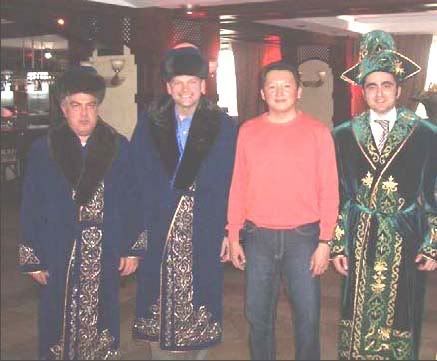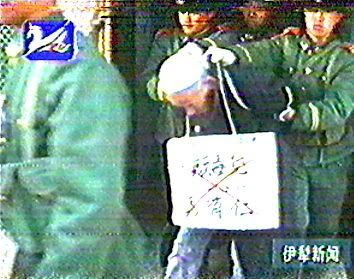Is Kazakhstan Taking Advantage of Shadow Lobbying in the United States, or What is the real value of being a Bush Political Appointee?

Stephen Payne with Timur Kulibayev (center)

Stephen Payne doing some shooting practice with VP Dick Cheney
A look at the Department of Justice’s database of official lobbyists for foreign states indicates that only two U.S. firms are officially employed by the Government of Kazakhstan at the moment. One is a law firm based in New York called DLA Piper. The other is APCO Worldwide, Inc., whose executive Vice President, Elizabeth Jones, is a former U.S. Ambassador to Kazakhstan. While the Department of Justice website does not offer full information on DLA Piper’s agreement with Kazakhstan, it does have copies of APCO’s agreements, which authorize the company to conduct lobbying and public relations activities on behalf of the Government of Kazakhstan. Whatever one’s attitudes towards the lobbying efforts of foreign states, these activities are fully legal and registered by the Department of Justice.
The recent scandal involving Stephen Payne that was brought to light by London’s Sunday Times, however, brings into question whether many lobbyists have found ways to do their work for foreign states and politicians while avoiding registration with the Department of Justice. Payne’s company, Worldwide Strategic Partners, allegedly has done work for the Government of Kazakhstan, but not through official channels. According to the Sunday Times, World Strategic Partner’s sister company, World Strategic Energy, also has a subsidiary called Caspian Alliance, which has been working for KazmunaiGas (KMG) as its American representative.
As I mentioned in my last post, the specificity of Kazakhstan politics creates a situation where the borders between KMG and the Kazakhstan state are frequently indiscernible, even more so because Timur Kulibayev, former head of KMG, is President Nazarbayev’s favorite and most powerful son-in law. In this context, can we assume that part of Caspian Alliance’s work for KMG could have involved lobbying for the Kazakhstan government, including perhaps efforts to bring Cheney to Kazakhstan in 2006 as alleged by Dosmukhamedov in the Sunday Times? Such activities would, of course, be beyond the scope of their declared work on the behalf of KMG. If these allegations all prove to be true, is Payne an unregistered “shadow lobbyist” for a foreign government, and is he merely one of many such people working on the edges of the Bush administration?
Such revelations, if true, may get to the heart of some of the most surreptitious ways that influence is peddled in Washington. While Americans are often aware of the ways in which influence is bought and sold in our legislative branch, we are less aware of how this may happen at the executive level. Afterall, why do we see powerful and wealthy people time and again taking political appointments in presidential administrations when on paper such a job-change frequently requires a substantial pay cut? Usually, it is assumed that jumping to an appointed government position from the private sector has long-term benefits upon return to the private sector. In Payne’s case, however, it could have had more immediate financial benefits to him. It is not clear whether Payne was a regular Schedule “C” political appointee, but he evidently had some sort of appointment allowing him be placed on a Department of Homeland Security Advisory Committee and to qualify to travel officially with Bush and Cheney on foreign visits. Are there other peripheral political appointees in the Bush administration who might be involved in the type of “shadow lobbying” that Payne allegedly undertook? Does this also explain why lobbyists are so eager to be involved in political campaigns? It should be noted, for example, that McCain advisor Randy Scheunemann allegedly was on Payne’s payroll for the same Caspian Alliance that may have been tied to lobbying for Cheney’s visit to Kazakhstan.
In terms of Kazakhstan, this scandal seems to be bringing more attention to the country in the U.S. than anything since the emergence of Borat. If Kazakhstan’s fictitious Borat served to expose Americans’ ignorance of other countries, his “more real” compatriot Yerzhan Dosmukhamedov is now exposing the results of this ignorance through the ability of hired “spin-doctors” to manipulate our foreign policy. Furthermore, Kazakhstan looks much worse in this PR scandal than it did during the heyday of Borat. If the scandal continues to roll out, people in Astana may begin to get nostalgic for the kind of PR Kazakhstan was getting from Borat.














